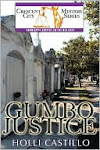 For those whose writing includes police procedure, particularly in the area of confessions or police interviews, there is new policy out there just decided by the Justice Department, that requires certain federal agencies, such as the FBI, DEA, ATF, and Marshals Service, to use electronic recording to video record "interviews" of suspects.
For those whose writing includes police procedure, particularly in the area of confessions or police interviews, there is new policy out there just decided by the Justice Department, that requires certain federal agencies, such as the FBI, DEA, ATF, and Marshals Service, to use electronic recording to video record "interviews" of suspects.Keep in mind, this is on a federal level, not state level. Every state agency has its own procedures for conducting interviews. The procedure and policy may vary from jurisdiction to jurisdiction within each state, and may even vary among departments in the same jurisdiction. For instance, New Orleans has 8 police districts. Each district may handle its confessions and statements differently, and the different departments in the same district (usually in the same police station) may even have different policies on taking statements. The homicide division in one district may record all statements taken, while the burglary division in the same district may say they don't own a tape recorder.
The U.S. Constitution requires that statements used against a defendant be voluntary and free from coercion and duress. It does not require that they be recorded.
The Justice Department has now decided to videotape statements taken from suspects, unless there are extenuating circumstances that prevent it. (Sounds like a loophole to me, but I'll skip it for now.) This decision has both positive and negative ramifications.
First, on the positive, it will be difficult for a defense attorney at trial or on appeal to argue that a suspect was beaten or threatened into giving a statement or confession if the whole thing is on tape. Juries will also be more inclined to convict if they see the defendant admit guilt for themselves.
 On the other hand, a suspect who is ready to spill his guts may change his mind in the time it takes to set up the video or audio recorder. He may have time to think and change his story, or he may have time to decide to ask for an attorney.
On the other hand, a suspect who is ready to spill his guts may change his mind in the time it takes to set up the video or audio recorder. He may have time to think and change his story, or he may have time to decide to ask for an attorney.There are two caveats to this rule. As I mentioned above, if it is not going to be easy to get the equipment, such as in cases when a defendant confesses at the crime scene and not in an interrogation room, it may not be practical to haul a video camera out. (Although with cameras and video in cell phones these days I'm not sure that is a valid excuse not to record a statement.)
Second, a suspect has the right to refuse to have his statement recorded. This also has implications. A suspect can claim he didn't make the statement and that's why it's not recorded. On the other hand, if a suspect doesn't make a statement, or if law enforcement wants to twist his words around, the agent can always say the suspect refused to be taped.
 For those who write about federal agents, this can be a new twist or curve in the road when a suspect confesses or gives a statement. I can picture stories with videotaped confessions that go missing, juries who don't believe the agents that the defendant made the statement but refused to be taped, and agents who really do beat confessions out of suspects and consequently don't tape the statements. Anything to keep the reader guessing as to what actually happened.
For those who write about federal agents, this can be a new twist or curve in the road when a suspect confesses or gives a statement. I can picture stories with videotaped confessions that go missing, juries who don't believe the agents that the defendant made the statement but refused to be taped, and agents who really do beat confessions out of suspects and consequently don't tape the statements. Anything to keep the reader guessing as to what actually happened.With the new Justice Department policy, writers should at least allude to videotaping or audio taping the confession if one is made to a federal law enforcement officer in the novel , especially if the confession is important to the story and a videotape or audiotape of the statement is not going to be presented.









